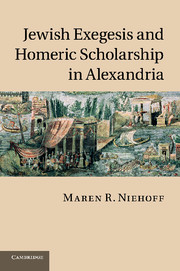Book contents
- Frontmatter
- Contents
- Acknowledgements
- List of abbreviations
- 1 Setting the stage
- Part I Early Jewish responses to Homeric scholarship
- 2 A conservative reaction to critical scholarship in the Letter of Aristeas
- 3 Questions and answers in Aristotelian style: Demetrius' anonymous colleagues
- 4 Aristobulus' questions and answers as a tool for philosophical instruction
- Part II Critical Homeric scholarship in the fragments of Philo's anonymous colleagues
- Part III The inversion of Homeric scholarship by Philo
- Epilogue
- References
- Index of Greek terms
- Index of sources
- Index of modern authors
- General index
2 - A conservative reaction to critical scholarship in the Letter of Aristeas
Published online by Cambridge University Press: 03 May 2011
- Frontmatter
- Contents
- Acknowledgements
- List of abbreviations
- 1 Setting the stage
- Part I Early Jewish responses to Homeric scholarship
- 2 A conservative reaction to critical scholarship in the Letter of Aristeas
- 3 Questions and answers in Aristotelian style: Demetrius' anonymous colleagues
- 4 Aristobulus' questions and answers as a tool for philosophical instruction
- Part II Critical Homeric scholarship in the fragments of Philo's anonymous colleagues
- Part III The inversion of Homeric scholarship by Philo
- Epilogue
- References
- Index of Greek terms
- Index of sources
- Index of modern authors
- General index
Summary
The author of the Letter of Aristeas is known as a proud Alexandrian Jew, who was well integrated into the elitist culture of his surroundings. He wrote in elevated Greek style and was familiar with the Ptolemaic court as well as contemporary notions of a philosophical symposium. In this chapter I shall inquire whether Aristeas' general familiarity with Alexandrian culture also included Homeric scholarship. This question is of particular importance because of the relatively early date of the Letter. Accepting Peter Fraser's arguments for its composition during Philometor's rule, probably during its second half (164–145 bce), I shall argue that the Letter provides crucial insights into the state of biblical research during the peak of Homeric scholarship, when Aristarchus was chief librarian (c. 160–131 bce).
Pioneering work on the Letter of Aristeas was done by Günther Zuntz, who pointed to certain scholarly terms in the Letter which reflect the work of Alexandrian Homer scholars, without, however, being systematically applied. In his view, the author of the Letter suggests certain parallels between Alexandrian scholarship and the production of the Greek translation but on the whole lacks clarity and even a consistent message. Sylvie Honigman accepts Zuntz's basic observation but argues that the blurring of scholarly activity and the process of translation was deliberate. In her view, it testifies to the author's conviction that the LXX was sacred precisely because its production conformed to scholarly rules.
- Type
- Chapter
- Information
- Jewish Exegesis and Homeric Scholarship in Alexandria , pp. 19 - 37Publisher: Cambridge University PressPrint publication year: 2011



